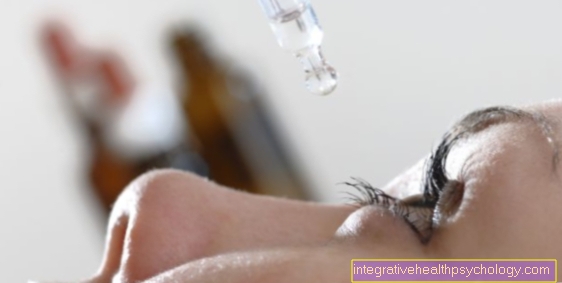Excessive sweating / hyperhidrosis
Synonyms in a broader sense
Medical: hyperhidrosis
Hyperhidrosis facialis = sweating in the face
Hyperhidrosis manuum = sweating of the hands
Hyperhidrosis palmaris = sweating of the palms
Hyperhidrosis pedis = sweating of the feet
Hyperhidrosis axilliaris = excessive sweating under the armpits
English: hyperhidrosis, excessive sweating
Definition of hyperhidrosis
The term hyperhidrosis (from the Greek "hyper": more, about and "hidros": water, sweat) describes the tendency to sweat excessively. This can occur in certain places as well as in the entire body.

Diagnosis of hyperhydrosis
The diagnosis of Hyperhidrosis is established clinically, which means that there are no objective examinations (e.g. measuring the amount of transpiration) that can lead to a diagnosis.
Only the examining doctor can make the diagnosis based on the symptoms, the medical history (anamnesis) and his medical examination.
In the case of patients who come with such symptoms, the first thing I do is shake hands. In these cases, it is often observed that the patient first wipes their hand on the trousers and then - still anxious - shaking hands.
The presentation to the doctor is one after years of suffering stress - situation. In some cases, in the course of the medical interview, it is noticed that sweat is dripping from the patient's hands.
In some cases it is difficult to distinguish between natural (physiological) sweating in extreme situations and excessive sweating as a disease state.
The subjective sensation of the patient helps to find the right way. People who already have a behavior disorder - most often this is the one social isolation - obviously have a disease that requires treatment.
Causes of sweating

The cause of sweating lies in a natural regulatory mechanism in the human body. If a patient is active in sport, his energy metabolism is increased and energy is provided in the form of glucose. This upregulation of the energy metabolism creates heat in the body, which somehow has to escape the body so that the body temperature does not rise. For this, so-called sympathetic nerve fibers are activated. These sympathetic nerve fibers are the cause of sweating because they ensure that the messenger substance acetylcholine is released and thus the sweat glands produce increased sweat and thus transport the excess heat in the body to the outside.
Thus, the cause of sweating is to be found in the involuntary, autonomic nervous system, which consists of the sympathetic and the parasympathetic. Involuntary, however, also means that you cannot control the amount of sweat production but that it automatically sweats as soon as the sympathetic system is strongly activated. The cause of sweating can also be that a patient is excited, for example before an exam or that a patient has an overactive thyroid (Hyperthyroidism), which then leads to the sympathetic tone being permanently increased. Another cause of sweating can also be a dysregulation of various hormones, which, for example, can occur during puberty or menopause (climacteric) the case is. For example, hot flashes can occur during menopause.
In general, the causes of sweating are usually nothing unusual, but patients who sweat excessively (hyperhidrosis) should consult a doctor. Above all, patients should be careful when sweating increases at night. The cause of night sweating can also be a tumor disease and is one of the so-called B symptoms. Infections, mental disorders, heart diseases or metabolic disorders can also be the cause of sweating, so patients who sweat more should definitely consult a doctor.
Read more on the topic: Causes of Excessive Sweating
forecast
Due to the different treatment approaches, there has been a significant improvement in the prognosis of hyperhidrosis in recent years. The impression arises that patients are now being taken much more seriously by their treating doctors than they were a few years ago.
After the introduction of "minimally invasive" surgery, the operation for hyperhidrosis has become much gentler.
As a result, more and more patients are opting for surgical treatment for whom conservative methods have yielded unsatisfactory results.
Sweating at night (night sweats)
For the appearance of night sweats (sweat at night) there can be a number of causes.
For most of those affected, sweating at night is a natural reaction of the body to an excessively high ambient temperature.
People who tend to sleep in warm pajamas and / or with the radiator fully turned on often complain of profuse sweating at night. In these cases, it is a completely harmless reaction that offers no indication of an illness.
Diet can also have a decisive influence on sweat production and secretion during the night.
In particular, hot spices and heavy meals eaten shortly before going to bed increase night sweat production and lead to night sweats.
The consumption of alcoholic beverages and various drugs also cause some people to sweat profusely at night.
In addition, there may be psychological causes that prevent the organism from falling into an appropriate state of rest during sleep.
The affected patients often suffer from profuse sweating at night.
Other reasons for night sweats to appear are fever-lowering drugs, antidepressants, and a variety of hormone preparations.
People who frequently suffer from profuse sweating at night or whose perspiration is so pronounced that their clothes and / or duvet covers have to be changed regularly should, however, urgently consult a doctor.
In these cases there is a possibility that a physical illness is the cause of night sweats.
The most common illnesses that lead to profuse sweating at night include hormonal disorders, such as those observed in the case of a malfunction of the thyroid gland.
The hormonal changes in the course of pregnancy or during the menopause can also lead to temporary sweating at night and have an enormous impact on the women concerned.
Read more on the topic: Night sweats during pregnancy
In addition, patients suffering from diabetes mellitus describe in many cases a greatly increased sweat production during the night.
Of course, profuse sweating during the night can also be directly related to various infections. In particular, patients suffering from virally induced flu, tuberculosis, HIV, hepatitis, malaria or inflammation of the inner lining of the heart usually develop periods of heavy sweating during the course of the disease.
Sweating at night is also one of the typical symptoms of various neurological diseases (for example Parkinson's disease).
Read more on this topic at: Sweating at night
If a patient suffers from sweating at night so profusely over a long period of time that even the clothes and bedclothes are permeated with fluid, the underlying condition may be a tumor.
Especially tumors of the blood-forming system (leukemia) and the lymphatic organs are expressed in many cases by profuse sweating at night.
In addition, a significant weight loss and permanent fever can usually be observed in the affected patients.
In medical terminology, this complex of symptoms, consisting of night sweats, weight loss and fever, is called "B symptoms“.
In summary, the most common causes that lead to profuse sweating at night:
- Thyroid disease
- Hormonal changes during pregnancy or menopause
- Wrong diet
- alcohol and drugs
- Mental illness
- Medication (for example antidepressants)
- Underlying diseases such as diabetes mellitus
- Infectious Diseases (Flu, HIV, tuberculosis)
- Tumor disease
Read more on the topic: Sweating at night
Sweating on the head
Sweating on the head is not uncommon, especially if the patient is exerting himself, for example doing sports or mentally (cognitive) operated. So sweating on the head is a natural (more physiological) Process of only abnormal or pathological (pathological) when there is no adequate cause for the excessive head sweating. The head, and especially the forehead, are particularly prone to excessive sweating because here, as on the palm of the hand, for example, there are particularly many sweat glands.
If the patient is now under stress, these sweat glands can use various sympathetic hormones (a nervous system that is activated, among other things, in stressful situations) to ensure that the sweat glands produce more sweat and release it via the forehead. This then leads to sweating on the head. However, it can also be the case that excessive head sweating is due to a serious illness. If a patient notices that the head sweats without exertion, a doctor should be consulted as it is, for example, an overactive thyroid (Hyperthyroidism) could act.
Since sweating on the head is difficult to treat or hide, it is important to see a doctor who will discuss various treatment options with the patient so that the patient does not withdraw from society.
Read more on this topic at:
- Sweating on the head
- Frey Syndrome- The gustatory sweating
Influence of the thyroid
The Thyroid hormones have a decisive influence on that taining various metabolic pathways.
Both the regular activity of the Cardiovascular system, as well as the functionality of the Muscles and the skeleton depend on the proper regulation of thyroid hormone release.
In addition, errors in this tight system can also have a negative impact on the Nervous system and the psyche exercise.
Blood formation, Regulation of the Gastrointestinal tract, Controlling the Fat storage and des Energy metabolism, all of these systems are closely related to the thyroid gland.
Because of this, thyroid malfunction can take the form of Hypothyroidism or Hyperthyroidism have serious consequences for the affected patients.
While one roughly assumes that a persistent lack of Thyroid hormones T3 and T4 All control loops of the organism tend to be shut down, an increase in the release of hormones results in permanent stress for the body.
Patients under a Overactive thyroid with increased production and release of T3 and T4 usually have one greatly increased heart rate, one increased irritability, profuse sweating and tend to Restlessness and aggressiveness.
Due to the enormous increase in the breakdown of the body's own fat reserves, people who suffer from an overactive thyroid appear in most cases to be very slim or even extremely thin.
Due to the large amounts of thyroid hormones that are released in a person suffering from hyperfunction, the organism begins to do so To boost the productivity of all glands.
In the area of Gastrointestinal tract this is expressed by a reduced reabsorption of fluid from the stool. The affected patients suffer from one increased stool frequency and frequent diarrhea.
Also the Functionality of the sweat glands is strongly influenced by the excess of thyroid hormones.
A patient who suffers from an untreated overactive thyroid is already starting to sweat in peace.
Even the slightest physical exertion does not lead to rapid fatigue in those affected (The heart and circulatory systems are ultimately upregulated), but they start to sweat much faster than a healthy person.
In addition, the Fluid excretion during sweating enormously increased.
In addition, people who suffer from an overactive thyroid often report that they sweat profusely at night and are sometimes even forced to change their pajamas several times.
How can you avoid excessive sweating?

Sweating is a completely normal function of the healthy organism.
By the secretion of sweat the overheated body surface be moistened. When this moisture evaporates, so-called "Evaporation cooling“And the organism can be effectively cooled.
Because of this, sweating should occur vigorous physical activity and or high temperatures not necessarily avoided.
The regular washing of the body surface is basically sufficient to avoid unpleasant odors from sweating.
Despite the proven need to sweat, excessive sweating is extremely uncomfortable for most people.
So how can you prevent excessive sweating without completely hindering the body's self-regulated cooling?
Since, as already described, a film of liquid is distributed on the skin through sweating and the surface of the skin is to be cooled by the evaporation cold, it stands to reason that sweating can at least partially be prevented by regularly moistening the skin.
However, this measure would be very cumbersome and hardly feasible.
However, people who suffer from profuse sweating can already go through the Adjusting their eating habits prevent enormous perspiration.
To prevent sweating in the long term you should above all Fruits, vegetables and dairy products are on the menu. Spicy dishes and excessive amounts of salt however, should be avoided.
In addition, the Refrain from alcohol, coffee and tobacco products help to effectively prevent sweating.
In addition, a Reduction in body weight help prevent excessive sweating.
In order to create enough space on the skin surface for heat regulation, people who suffer from profuse sweating should rather loose clothing be worn.
They are also suitable Natural fibers, for example cotton, linen or silk, to prevent excessive sweating and thus prevent unpleasant body odor.
For people who only temporarily suffer from increased perspiration, a cure with Sage tea help to improve the body's temperature regulation.
In this context, those affected should be asked for a period of one to two weeks every day roughly one liter Consume sage tea.
In addition, can also regular exercise help to prevent sweating or at least to permanently reduce excessive sweat production.
This method may sound confusing because it creates a large amount of sweat while exercising.
Still one leads targeted, stimulated sweat production result in the body producing lower amounts of sweat when at rest.
In a similar way, the regular visits to a sauna help to improve the organism's heat regulation when at rest and to reduce sweating in the long term.
In many cases, however, these simple remedies are not enough to effectively prevent sweating. People who sweat profusely even with a suitable diet and the use of various home remedies should have one Consult a specialist.
After extensive examinations, a treatment strategy can be worked out with the doctor. Some of those affected are helped by special mixtures, so-called Antiperspirantsto prevent excessive sweating. These mixtures are usually Aluminum saltswhich are manufactured in pharmacies according to medical specifications.
When using antiperspirants, however, it must be borne in mind that a severe irritation of the skin surface is possible.
To prevent excessive sweating, the special mixture should be applied thinly to the surface of the skin before going to bed.
In addition, in pronounced cases, taking so-called Anticholinergics be useful. These prescription drugs are active ingredients that imitate the function of an important endogenous messenger substance.
In this way, the activity of the sweat glands can be reduced and excessive sweating can be prevented.
An anticholinergic should only be taken under medical supervision. The reason for this is the fact that when using these drugs there are pronounced side effects such as Constipation and Dry mouth can come.
The nerve poison is also suitable Botulinum toxin (in short: botox) particularly good at the activity of the Sweat glands to inhibit and thus prevent excessive sweating.
For most patients, this substance is more from the realm of Wrinkle treatment known. Applied locally, however, it can also be used to remedy heavily sweating people.
If even these medical measures do not lead to the desired goal, a operative treatment should be considered.
The sweat glands in the armpit area are surgically removed through a small skin incision.
In addition, the smallest nerve fibers that activate sweat glands can be destroyed during the operation.
However, since the risks of this treatment method are very high, other therapy options should always be exhausted in advance.
In addition, it should be noted that the surgical removal of the sweat glands to prevent excessive sweating is not covered by health insurance in all cases.
treatment
Treating sweating is often very difficult and should not be done in every patient. As long as a patient not sweating in excessive form it is important to sweat as one accept natural body process which is vital to get rid of the excess heat in the body. Against simple armpit sweating it is best to have a Deodorant without additives and to use perfumes.
However, further treatment against sweating is often only possible to a limited extent. There are the so-called Antiperspirants, however, these contain aluminum chlorides and have therefore fallen into disrepute because these ingredients are said to promote cancer, among other things. It is controversial whether aluminum chlorides also promote dementia. Better offer yourself here Sage extracts which are not the only treatment for sweating, but that Reduce sweating can.
In the so-called Tap water iontophoresis is it a Treatment of sweating used on hands and feet can be. Here is electricity over the water passed into feet and handswhich then reduces sweat production for a short time. In rare cases it comes Botulinum toxin A used as a treatment against sweating. However, this can lead to irreversible paralysis which is why this treatment option is called penultimate possibility should be chosen. The last treatment option against sweat is that surgical removal of skin areas including the contained sweat glands. (see: Remove sweat glands)
Summary
The excessive perspiration can occur in one or more places, as well as in the entire body area.
The causes are mostly due to no organic changes. However, this should be excluded, especially in the case of sweating all over the body (generalized hyperhidrosis).
In the case of the localized disease, the patients complain about the symptoms since puberty and increasingly suffer from social isolation caused by increased sweating (sweating).
From psychotherapy to surgical treatment:
Nowadays there are various therapeutic approaches that can achieve an improvement in almost all cases. The operation ("ETS", see below) is a minimally invasive surgical treatmentthat brings excellent results, but also has its risks.
Each patient should therefore consider the risks and possible consequences of treatment.
Overall, the forecast of Hyperhidrosis / excessive sweating It has improved in recent years, not least because many doctors are now much more open about patient complaints.

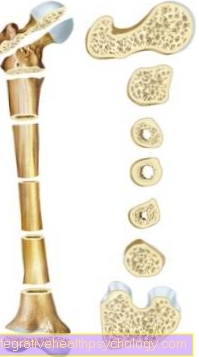






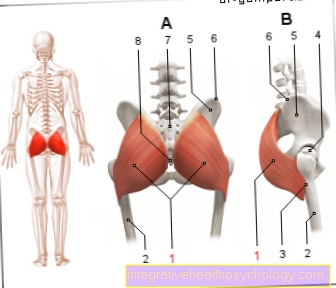

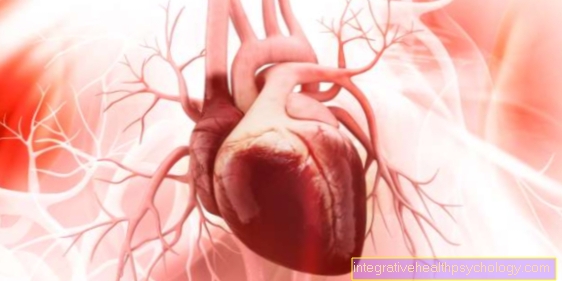

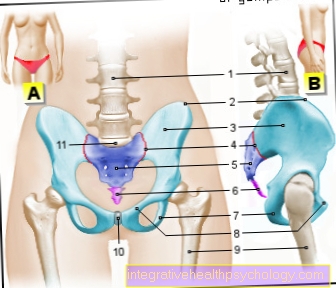
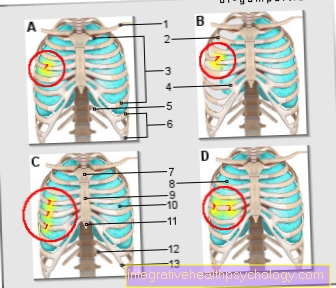
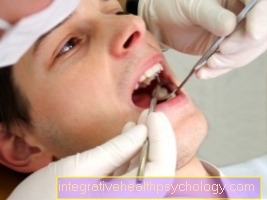


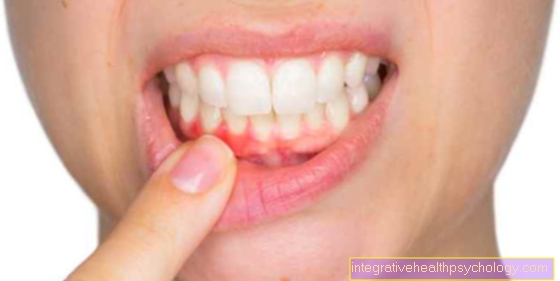

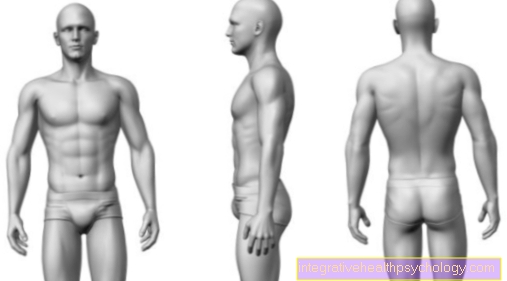
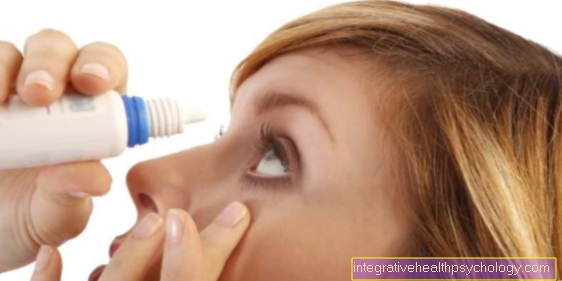

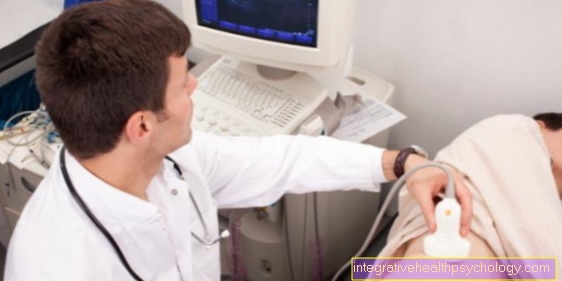


.jpg)


